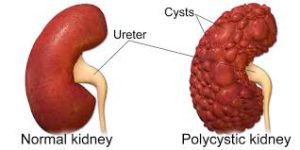Polycystic Kidney Disease and Pregnancy: What Every Woman Needs to Know

Polycystic Kidney Disease (PKD) is a chronic, inherited disorder that affects the kidneys, leading to the development of fluid-filled cysts that can impair kidney function over time. For women of childbearing age, the prospect of Polycystic Kidney Disease and pregnancy raises several important medical, emotional, and lifestyle questions. While advancements in healthcare have significantly improved outcomes for women with PKD, pregnancy in the context of this condition still requires careful planning, close monitoring, and an understanding of potential complications.
A detailed overview of what every woman needs to know about Polycystic Kidney Disease and pregnancy, offering insights into risks, management strategies, and the path to a safe and healthy pregnancy.
Related Article: Boost Your Kidney Health Naturally: The Top Supplements You Need
Understanding Polycystic Kidney Disease (PKD)
What is Polycystic Kidney Disease?
Polycystic Kidney Disease (PKD) is a genetic disorder characterized by the growth of numerous fluid-filled cysts in the kidneys. These cysts can enlarge the kidneys and disrupt their ability to filter waste from the blood, eventually leading to kidney failure.

Types of PKD
Autosomal Dominant PKD (ADPKD)
-
- Most common form.
- Symptoms usually appear between the ages of 30 and 50.
- A child has a 50% chance of inheriting the disease if one parent has it.
Autosomal Recessive PKD (ARPKD)
-
- Rarer and more severe.
- Symptoms often appear shortly after birth or in early childhood.
- Both parents must carry the faulty gene for a child to be affected.
Symptoms of PKD
- High blood pressure
- Back or side pain
- Blood in the urine
- Frequent kidney infections
- Enlarged abdomen due to swollen kidneys
- Kidney stones
- Fatigue
- Urinary tract infections (UTIs)
Polycystic Kidney Disease and Pregnancy: Is It Safe?
Polycystic Kidney Disease (PKD) is a genetic disorder in which clusters of cysts develop primarily within the kidneys, causing them to enlarge and lose function over time. If you have PKD and are considering pregnancy or are already pregnant you may have questions about safety, risks, and how to manage your health.
Is Pregnancy Safe with PKD?
For many women with PKD, pregnancy is possible and can be safe, especially if kidney function is still relatively normal. However, it does carry some increased risks and requires close monitoring.
Possible Complications
- Preeclampsia or Eclampsia
- Preterm labor
- Intrauterine growth restriction (IUGR)
- Worsening kidney function
- Cesarean delivery may be more likely depending on maternal or fetal complications.
Tips for a Safer Pregnancy with PKD
- Plan Ahead: Consult your doctors before conception to assess risks and adjust medications.
- Manage Blood Pressure: Use pregnancy-safe medications as needed.
- Stay Hydrated: Helps reduce strain on the kidneys.
- Eat a Balanced Diet: Reduce sodium and processed foods.
- Attend All Appointments: Early detection of complications can improve outcomes.
General Outlook
In general, most women with well-controlled PKD and good kidney function can have successful pregnancies. However, those with reduced kidney function, high blood pressure, or other systemic complications may face greater risks for both maternal and fetal outcomes.
Related Article: Polycystic Kidney Disease Natural Treatment At Home
Key Risks of Polycystic Kidney Disease and Pregnancy
Understanding the risks associated with Polycystic Kidney Disease and pregnancy is essential for proper management and decision-making.
1. Hypertension (High Blood Pressure)
Women with PKD are at a higher risk of developing or exacerbating hypertension during pregnancy. Uncontrolled hypertension can lead to serious complications such as:
- Preeclampsia: A condition characterized by high blood pressure and organ dysfunction, which can threaten both mother and baby.
- Placental abruption
- Preterm labor
- Low birth weight
2. Decline in Kidney Function
Pregnancy places additional strain on the kidneys. For women whose PKD has already impacted kidney function, pregnancy can accelerate decline, especially in later stages of chronic kidney disease (CKD).
3. Proteinuria
Protein in the urine, a common symptom of kidney dysfunction, can increase during pregnancy. This can be a marker for preeclampsia or worsening renal health.
4. Urinary Tract Infections (UTIs)
Women with PKD are more susceptible to UTIs, which can complicate pregnancy if not promptly treated.
5. Cyst Complications
Although rare, cysts in the kidneys or liver can occasionally rupture or become infected during pregnancy.
6. Genetic Transmission
Women with ADPKD have a 50% chance of passing the condition to their offspring. This brings up important considerations regarding genetic counseling and prenatal diagnosis.
Every Woman Needs to Know
Preconception Planning for Women with PKD
The best way to ensure a safe experience with Polycystic Kidney Disease and pregnancy is through thorough preconception planning. This should include:
1. Renal Function Assessment
A nephrologist should assess baseline kidney function. Women with an estimated GFR above 60 generally have a better prognosis in pregnancy. Those with GFR below 45 may face increased risks and should discuss alternatives or specialized management.
2. Blood Pressure Control
Pre-existing hypertension should be tightly controlled before conception. Medications such as ACE inhibitors and ARBs, while effective, are contraindicated during pregnancy and may need to be switched in advance.
3. Medication Review
Certain medications used for PKD or related conditions may not be safe during pregnancy. These include:
- ACE inhibitors
- ARBs
- Tolvaptan (a vasopressin receptor antagonist used to slow PKD progression)
4. Genetic Counseling
Since PKD is inherited, prospective parents may benefit from genetic counseling to understand the risks and options, such as:
- Prenatal testing
- Preimplantation genetic diagnosis (PGD) with IVF
Related Article: Best Yogurt For Kidney Disease Making The Right Recovery Choice
Managing Pregnancy with PKD
Once pregnant, a woman with PKD should be followed closely by a multidisciplinary team including a nephrologist, obstetrician (preferably a maternal-fetal medicine specialist), and possibly a genetic counselor.
1. Frequent Monitoring
- Kidney function tests (GFR, serum creatinine)
- Blood pressure monitoring
- Urinalysis for protein and infection
- Fetal ultrasounds to assess growth and amniotic fluid
2. Diet and Lifestyle
Nutrition and lifestyle play a key role in managing Polycystic Kidney Disease and pregnancy:
- Low-sodium diet to manage blood pressure
- Adequate hydration to help prevent UTIs and support kidney health
- Protein moderation depending on kidney function
- Physical activity, as advised by the healthcare team
3. Medication Adjustments
Safe medications during pregnancy for hypertension include:
- Labetalol
- Methyldopa
- Nifedipine
Antibiotics for UTIs should be chosen carefully to avoid harm to the fetus.
Labor and Delivery Considerations
Women with PKD typically can have a vaginal delivery unless obstetric complications necessitate a cesarean section. However, labor may be more closely monitored due to the risk of:
- Elevated blood pressure
- Fetal distress
- Preterm labor
Pain management options may also be discussed in advance, especially if kidney function is impaired or if there are spinal issues from associated conditions like polycystic liver disease or intracranial aneurysms.
Postpartum Care and Breastfeeding
1. Kidney Monitoring
The postpartum period can be a time of increased kidney stress, particularly if there was preeclampsia or other complications. Monitoring kidney function and blood pressure is essential.
2. Breastfeeding Considerations
Breastfeeding is generally safe for women with PKD, but medication safety should be reviewed. Many blood pressure medications and other drugs used for kidney disease may pass into breast milk.
When Pregnancy Is Not Recommended
In some severe cases, Polycystic Kidney Disease and pregnancy may be strongly discouraged. This is particularly true for women who:
- Are in end-stage renal disease (ESRD)
- Require dialysis
- Have uncontrolled hypertension or severe heart disease
- Have had recent cyst infections or hemorrhages
- Possess a history of intracranial aneurysms or subarachnoid hemorrhage
For these women, alternatives such as adoption, surrogacy, or child-free living may be discussed as part of the reproductive planning process.
Related Article: Exclusive: American Kidney Fund, Ubie Partner For AI Kidney Disease Detector
Advances in Treatment and Hope for the Future
Advances in Treatment and Monitoring
Recent developments in Polycystic Kidney Disease Treatment and maternal-fetal care have made it easier to manage the disease during pregnancy:
- Early Detection and Genetic Testing
Genetic counseling and prenatal testing (like amniocentesis or chorionic villus sampling) allow parents to understand the risk of passing PKD to their children. Preimplantation genetic diagnosis (PGD) with IVF is also an option for those seeking to avoid transmission. - Improved Blood Pressure Management
Controlling blood pressure is crucial in PKD pregnancies. Newer antihypertensive medications (safe in pregnancy) and closer prenatal monitoring help reduce complications. - Tolvaptan Therapy
Tolvaptan, a vasopressin receptor antagonist, has shown promise in slowing kidney growth and function decline in autosomal dominant PKD. However, it is not recommended during pregnancy, so therapy may need to be paused under medical guidance. - Multidisciplinary Care Teams
Collaborative care involving nephrologists, obstetricians specializing in high-risk pregnancies (maternal-fetal medicine), and genetic counselors ensures comprehensive monitoring and timely intervention.
Hope for the Future
Research is ongoing to better understand the genetic mechanisms of PKD and to develop targeted therapies. Clinical trials exploring new drugs, gene editing (e.g., CRISPR), and regenerative medicine hold promise for more effective treatments and potentially a cure in the future.
For women with PKD who dream of motherhood, there is real reason for hope. Advances in care and personalized treatment strategies mean that pregnancy can be approached with greater confidence, supported by a strong healthcare team.
Conclusion
Polycystic Kidney Disease and pregnancy is a complex yet navigable journey for many women. While the condition does pose certain risks, proactive planning, early intervention, and comprehensive care can lead to successful pregnancy outcomes. Every woman with PKD deserves access to compassionate, individualized medical guidance to help her make informed choices about motherhood.
Whether you are currently pregnant, planning for the future, or simply exploring your options, understanding the implications of Polycystic Kidney Disease and pregnancy is the first step toward ensuring your health and the well-being of your child. Always consult with your healthcare providers and remember that you are not alone support and expert care are available to help you navigate this important phase of life.
Related Article: Living With Adult Polycystic Kidney Disease: Survival Tips And Tricks
Related Article: The Ultimate Polycystic Kidney Disease Diet: What to Eat & What to Avoid




